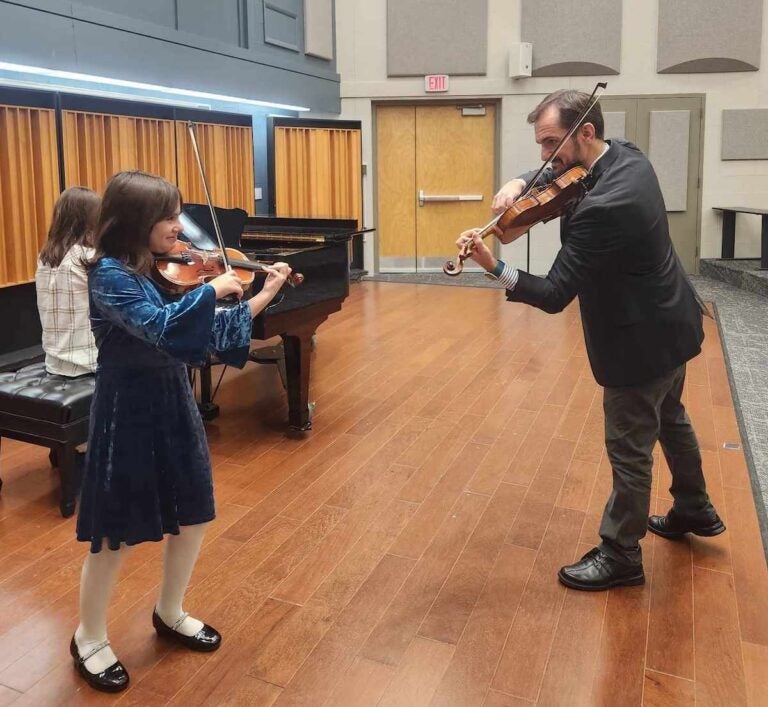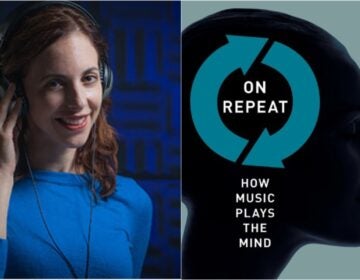For scientists, musical giftedness remains an enigma of human biology
Researcher Dawn Merrett at the International Laboratory for Brain, Music and Sound Research in Montreal is one of many scientists looking for answers.
Listen 9:14
Serban Petrescu and Tatyana Roytshteyn’s younger daughter, Alexandra (9) in this photo at a studio recital, with their older daughter Beatrice playing the piano at Widener University. (Courtesy of Serban Petrescu and Tatyana Roytshteyn)
This story is from The Pulse, a weekly health and science podcast.
Find it on Apple Podcasts, Spotify, or wherever you get your podcasts.
Pianist Tatyana Roytshteyn has been a professionally trained classical musician for most of her life. Several years ago, she started a small music school, serving as a private music instructor at a studio in Wallingford, Pennsylvania.
Most of her students are studying at an intermediate level – the youngest trainee being 3 years old and the oldest being 80. And while Roytshteyn has taught a wealth of talented musicians, she says, she has never come across a true musical prodigy.
“We’ve had some very talented kids that can do things at a very young age,” Roytshteyn said. “But I wouldn’t call them prodigies.”
Recently, Tatyana and her husband Serban Petrescu, concertmaster of the Newark Symphony Orchestra in Delaware, had several students perform at the 4th Annual Bösendorfer Youth Music Festival at the German Society of Pennsylvania, an event that showcases young musicians ages 6-18.
Each student is given up to 8 minutes to perform their musical pieces featuring arrangements from some of the most prominent composers over the centuries such as Ludwig van Beethoven, Frederic Chopin, Maurice Ravel and Muzio Clementi.
Some students were accompanied by either an instructor or a parent. One of the youngest musicians, Lucille Ren, was a bronze medalist, and flawlessly performed the Concerto No. 2 in D Major by Mozart on violin.
Among the gold medalists was 17-year old Lucas Lauprasert on viola from the Ann Newman Quartet in Philadelphia. They played the String Quartet in F Major Op. 18, No. 1 by Beethoven, nailing each note, tone and pitch with tremendous vigor and precision.
“When I was really young, I watched a TV show which incorporated a lot of classical music within its episodes,” Lauprasert said. “I just fell in love with them and ever since it’s been one of the main reasons why I told myself that I wanted to make music of my own.”
Another member of the quartet is 17-year old Gabriela Salvador-Riera on violin, who has played since she was 4-years old. She recalled being brought up in a “musical” household, even though her parents were not musicians themselves.
“We played a lot of music around the house. I would sing and dance a lot and then out of the blue my mom recalls that I kind of just started begging for violin lessons out of nowhere. ” she said.
But one myth about being an advanced musician at her age, Salvador-Riera said, is that it’s all an innate gift.
“It’s a pretty common misconception that it comes from just raw talent,” she said. “It’s a lot of hard work and that’s the main chunk of it.”
Salvador-Riera says she practices on average three hours a day.
Most lifelong musicians like Serban Petrescu believe that there’s a common misconception about up-and-coming musicians — that somehow all of them are prodigies.
Subscribe to The Pulse
When it comes to prodigies, Petrescu said that there’s a big difference between being talented and being that musically gifted.
“I think the popular ideal of a [music] prodigy would involve a child who has a great capacity to emulate — to get the physical part of music — but also hear it extremely quickly.”
For Tatyana Roytshteyn, what separates a young talented musician from a gifted musical prodigy is an emotional connectedness to the music.
“Some of the more advanced music not only requires technique to be able to just physically play it, but requires an emotional maturity,” she said. “That’s difficult for a very young child because they just haven’t had those emotional experiences. And maybe that’s what we’re talking about with prodigies — is that they have this ability to understand this very complicated musical language and be able to express it.”
Are musical prodigies’ brains different?
At the International Laboratory for Brain, Music and Sound Research (BRAMS) scientists have been looking for clues to explain this paradigm — how some people are more adept to music than others.
At a certain age during childhood, parents might notice that their kids have an unusual affinity toward music. This typically starts between the age of 2 and 3-years old, when children begin to pick up on how to create sounds, whether it’s from toys or an actual instrument.
Some children advance quicker than others, and can sing, play the piano or pluck the right strings on a guitar almost immediately.
The lab is run by scientists from the University of Montreal and McGill University who are studying music and auditory cognition. One of the questions they are investigating is whether musical prodigies have noticeable differences in their brains.
“A musical prodigy is not just somebody who is a little bit faster than their peers at gaining musical skills,” said postdoctoral research fellow Dawn Merrett. “In fact, they usually master at more than twice the rate of their typical peers.”
Several years ago, scientists at BRAMS recruited a few dozen young musicians in North America for a comprehensive neurological study to evaluate their brains.
“In our study, they needed to have attained professional music ability before age 14,” Merrett said.
BRAMS chose participants who won either a national or international competition before the age of 12. They identified about 20 young musicians in this study, and a control group of talented — but not prodigy level musicians.
Researchers conducted a series of evaluations to test memory, sound recognition and overall biological differences. The lab also conducted a series of MRI scans to see if they could find any brain differences between the two groups.
“We started by looking more at the macro structure of the brain. So looking at things like the cortex, how thick that is, the size and shape of different areas of the brain,” she said.
When it comes to explaining the difference between talented and prodigy level musicians, Merrett said that the results have been surprising — and perhaps unsatisfying.
“Neurologically, so far, we haven’t really seen any clues that would help us to understand whether they have different brains,” she said.
Results that left BRAMS baffled, given that researchers believed that things like intense practice would guarantee how the brain is rewired.
But Merrett said researchers did notice some things that stood out about the prodigies. For example, they reported a higher level of focused energy and immersion when it came to playing music.
“What we did see that was different was that when they self-report their ability to get into a flow state prodigies said that they were much more able to get into a flow state then other musicians with equivalent experience,” she said.
So while it’s still unclear where musical giftedness comes from — it’s a mystery that science might not be ready to solve.
WHYY is your source for fact-based, in-depth journalism and information. As a nonprofit organization, we rely on financial support from readers like you. Please give today.







